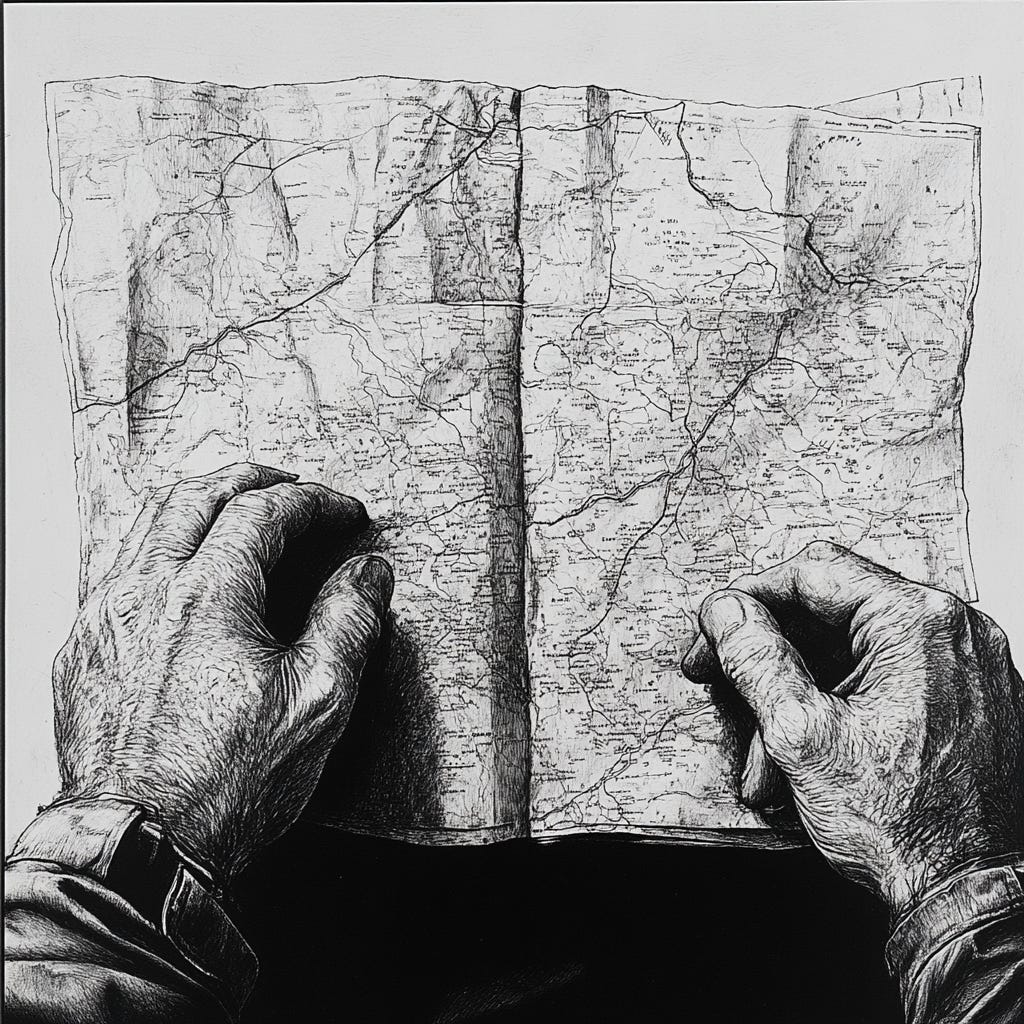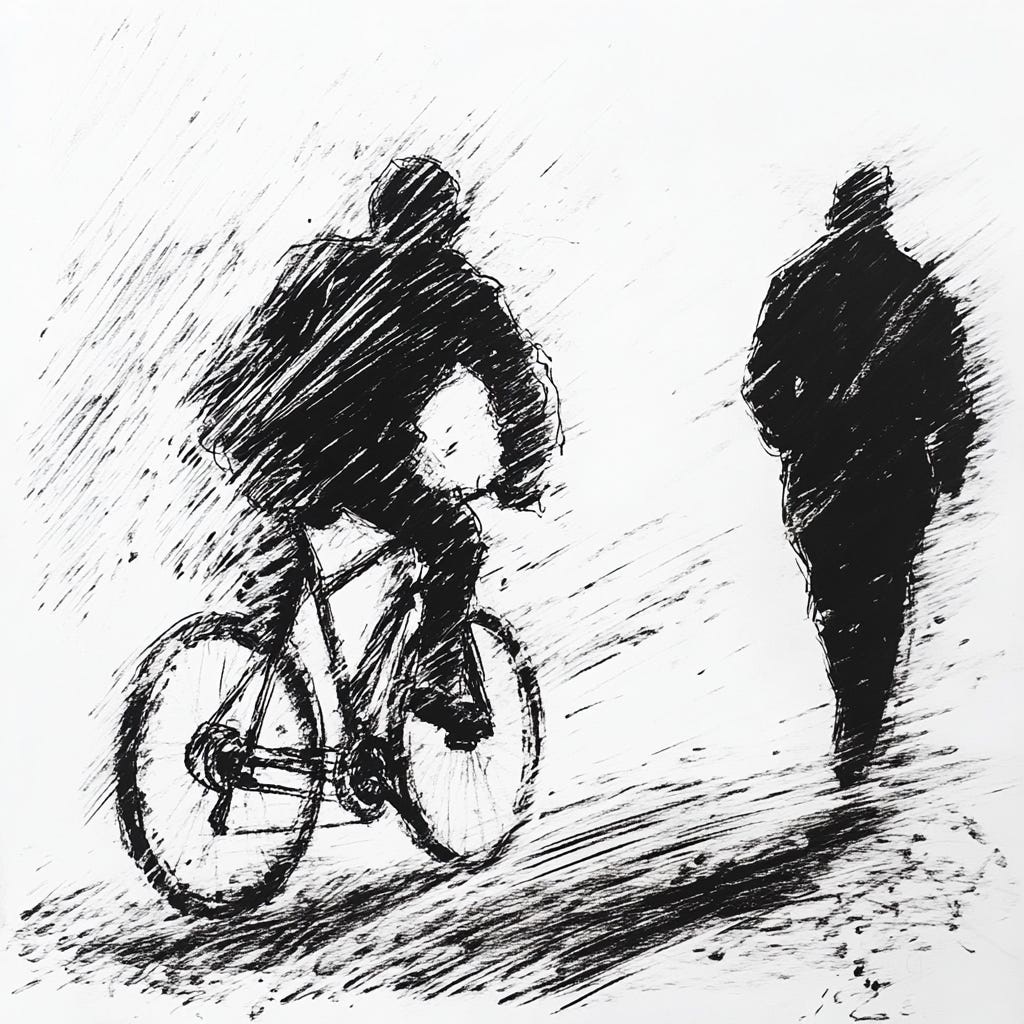Once, feeling a magnitude of lethargy only explained by a hangover and a deep night of partying, I ordered UberEats from a restaurant around the corner from my house. You know the laziness I mean; it took longer to decide what to order on the app than walk down and pick it up. In the face of my sloth, the friction caused by putting on pants and talking to someone at a counter was too much. The convenience - which Uber has built a multi-billion dollar business on - was too damn good. Slob city, here I come.
In a satisfying cosmic twist, my Uber driver bailed on me. I watched in rising apprehension as they approached the house, then disappeared. I went outside, peered around to see if my food was there, then sheepishly wandered back in because it wasn’t and because I could see the roof of the place I’d ordered from. Karma is eternal. I definitely, definitely deserved this. I almost tipped the driver.
Walter Benjamin, writing at the swelling tide of modernity in the 1930s, wrote that the conveniences of modern life might have the unintended effect of curtailing experience. Rather than go through the agony of, say, walking down to a local restaurant, we can instead bypass the messy experience through a screen. The result, he suggested, would be a deadening of the spirit. One wonders what Benjamin, for whom the motor car was the pinnacle of modern convenience, would wonder about Google Maps (and its integration with the Google Suite, a grossly compelling convenience to which I’m utterly enthralled).
Progress is Real
In fact, technological advancement can largely be viewed in terms of increased convenience. Economists might prefer to call them efficiencies, and while convenience and efficiency are slightly different things, they tend to go hand in hand. This is, on net, probably a good thing. Rather than trawl through a library using the Dewey decimal system, I Google it. Rather than walk for hours or days, I can jump in a car. Rather than (ahem) walk to a restaurant, I can hit a few buttons and chill out.
One way we can think about the reduction of friction in doing things is through what economists call capabilities. It’s a real, important component of progress. Instead of conceptualising human progress through transient states like ‘happiness’ or ‘freedom’, technology provides human beings with additional option-sets to expand their sense of reality. For example, without transport, my options in life are restricted to wherever I can go on foot. If my school is in the next town over, I might not be able to get educated at all. Or, if I don’t have a bank account, I have to rely on cumbersome, inconvenient ways to store all my wealth like cows and gold.
Bikes and banks are technologies that increase my capabilities because they expand my choice sets and scale up what I can achieve for myself. Transporting myself to institutions can give me an education, just as bank accounts let me participate in the wider economy. Technology is a way of bringing us closer to the world, connecting us with more ideas and ways of engaging with it, starting with our OG tech, language.
It reduces friction, baby, and we ought to celebrate that. Maybe Benjamin was on to something too, though, and maybe friction has an important function too.
Pain for Pleasure
In her work on dopamine, Anna Lemke highlights how our physiology seems to have an equilibrium, a homeostasis we return to after pleasurable or painful experiences. When we experience pleasure, our bodies return to this equilibrium after the initial shot of dopamine to motivate us for reward. If we don’t, the return journey becomes intrinsically harder - we have to work harder for that same pleasure, often by repeating the experience with higher doses. We jump on the hedonic treadmill. Our stasis is disturbed.
The thing is, technology has also introduced a cornucopia of ways to access pleasure with virtually no friction. Want sex? Watch some porn on your phone. Want drugs? Message your dealer and they’ll come to you. Want entertainment? Reels and TikTok right there. Want food? Umm, order on UberEats. Lemke, in her book Dopamine Nation, points out that diseases of addiction are far more common in developed economies - exactly the sort that have the kinds of technological capabilities that are hallmarks of progres. Pleasure can never last, but when we pretend it does we become helpless to the recursive loops of engagement the tech industry relies on.
I’m not a throw-the-bathwater-and-baby out kind of guy. Give me the capabilities afforded by technology any day. But I think the paradox of progress is that, against technology’s overwhelming tide, we might actually have to deliberately inject friction in our lives to compensate for life’s outrageous conveniences. The other side to the dopaminurgic equation is that denying it - by seeking challenges and constructive pain - we are more receptive to little pleasures. I remember my first multi-day hike, carrying a 20kg backpack and taking it off at the end of the first day. The pleasure of that unburdening, the sudden lightness and freedom it afforded was magnificent. I swear the birds were singing for me.
The Japanese have a word for self-imposed hardship; misogi. It’s a form of ritual purification, undertaking something uncomfortable to steel oneself. I think one of the paradoxes of progress is that we need to get very good at making little misogis for ourselves.
Deliberate Friction
Despite all our progress, the hallmarks of a well-lived life are kind of basic. A sense of purpose, a healthy body, spiritual fitness, economic security, and above all, happy relationships are mundane in their universality. They also all require some sacrifice to obtain. They require work. They probably require a good deal of friction, too. No matter how generative our AI gets, it will never be able to give you purpose, or communicate to your spouse for you. At best, it will help - but your existence will forever require some pain, a modicum of suffering.
It might seem dumb to “rawdog” experience these days; to go deliberately without technological enhancement. There’s an omnipresent opportunity to ‘stack’ reality to make it more interesting, more exciting. Add a vape to your afternoon drink, listen to a podcast when you go for a walk, doomscroll while going to sleep. As you know, though, turning life into a series of superstimuli is deadening. It reliably leads to burnout.
The literature on why conveniences lead to burnout is still emerging, but I can offer why I inject my life with silence and silly little challenges; to hear myself, and show my fears that friction is nothing to be feared. On the contrary. As each daily misogi is cleared, each workout crushed, each word typed, I show myself who I am; not a guy who orders UberEats from the couch, but one who walks in straight backed and loose limbed, wearing his hangover proudly before saying to the waiter with a steeley glint in his eye -
“One chicken shawarma plate, please.”

















Share this post